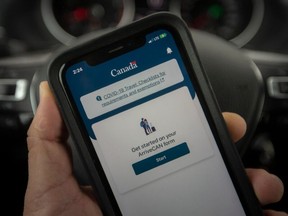The problem-plagued ArriveCAN app has been the focus of criticism.

The federal government is ending COVID-19 travel rules, including vaccine mandates, mandatory use of the ArriveCAN app and masks for travellers on planes and trains, to take effect Oct. 1.
Some of the changes announced Monday have long been called for.
Sign up to receive daily headline news from Ottawa Citizen, a division of Postmedia Network Inc.
Thanks for signing up!
A welcome email is on its way. If you don't see it, please check your junk folder.
The next issue of Ottawa Citizen Headline News will soon be in your inbox.
The problem-plagued ArriveCAN app has been the focus of criticism, including from tourism officials and businesses in border towns who have complained that it is keeping travellers from coming to Canada.
Critics say it has been ineffective at stopping or significantly slowing the introduction of COVID-19 variants of concern.
The app has been glitch-prone, advising thousands of travellers to quarantine for 14 days when they did not have to, at one point. Border mandates were also a focus of the convoy occupation in Ottawa and protests elsewhere this year.
A report by four infectious disease, emergency and pandemic management doctors released last week concluded that Canada’s pandemic travel measures had not been successful in significantly stopping the spread of COVID-19 variants of concern across Canada. The report was released by the Canadian Travel and Tourism Roundtable, which has called for relief from pandemic border restrictions.
Still, the decision to lift mask mandates on planes and trains at the start of what is expected to be a severe viral season is being criticized by some health experts and travellers.
Dr. Gerald Evans, an infectious disease specialist at Queen’s University and a member of Ontario’s now-dissolved COVID-19 Science Advisory Table, said ending border controls makes sense.
“I think border controls disappearing is completely reasonable. I don’t think they are in any way functioning to have control over transmission.”
But Evans said that is not true of mask mandates.
“We do know that masking is effective at reducing transmission.”
Evans said he was surprised to see the federal government announcement on border measures include ending mask mandates on airplanes, trains and buses crossing into Canada.
“Getting rid of masks strikes me as having nothing to do with border controls.”
Evans said COVID-19, especially the highly transmissible Omicron variants, can spread easily in enclosed spaces, such as buses and trains. Airplanes, he said, have effective air filtration systems, which reduce the risk of transmission when they are flying, but those are not in place when they are on the ground.
“The worst part of travelling by plane is the departure lounge and boarding.”
He said he expects many people will continue to wear masks when travelling.
The medical experts whose report was released last week noted that the mask mandates are inconsistent and target the travel sector.
“The continued imposition of travel measures at Canada’s border is costly, illogical and inconsistent at this point,” said Dr. Dominik Mertz, associate professor, division director of infectious diseases at McMaster University.
“While Canadians are free to attend concerts, sports, games and many other daily activities, the travel industry continued to be singled out without any scientific basis,” Mertz said.
The travel-related mask mandates are among the last of such mandates in place in Canada.
In Ontario, the province still requires masks in long-term care and retirement homes, and hospitals have implemented their own mask mandates. Some universities and colleges also require masks. In other public spaces, mask use is no longer mandatory.
The lifting of most mask mandates last spring was followed by an Omicron-fuelled surge in COVID-19 cases.
As of last month, people are no longer required to isolate for five days after a COVID-19 infection in Ontario, but are asked to remain home for 24 hours after their symptoms improve and to mask for 10 days.
Health officials, including Ottawa’s medical officer of health, Dr. Vera Etches, strongly recommend people continue masking indoors and in crowded outdoor spaces.
The federal ministers of health, transport and public safety, who announced the removal of the border and travel measures, also recommended travellers continue to wear high-quality and well-fitted masks on their journeys.
Federal Health Minister Jean-Yves Duclos said the border measures can be removed, “thanks, largely to Canadians who have rolled up their sleeves to get vaccinated.” He added that COVID-19 and other respiratory illnesses are expected to continue to circulate over the cold months “so I encourage everyone to stay up-to-date with their COVID-19 vaccination, including booster doses, and exercise individual public health measures.”
-

Expert reviewer urges OPH to continue surveillance and reporting on COVID-19
-

Ottawa travellers unenthusiastic as reports say feds are set to end remaining COVID-19 travel rules


